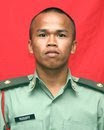The National University of Malaysia Universiti Kebangsaan Malaysia) is a public university university located in Bangi Selangor which is about 35 km south of Kuala Lumpur. Its teaching hospital, Universiti Kebangsaan Malaysia Medical Centre (UKMMC) Pusat Perubatan Universiti Kebangsaan Malaysia (PPUKM) is located in Cheras and also has a branch campus in Kuala Lumpur. Currently there are 17,500 undergraduate students enrolled, and 5,105 postgraduate students of which 1368 are foreign students from 35 different countries. Universiti Kebangsaan Malaysia is one of the five research universities in the country. It was ranked by The Times Higher Education Supplement (THES) at number 185 in its annual ranking of the world's top 200 universities for 2006.
History
The university was formally established on 18 May 1970. It initially operated in a temporary campus located at Lembah Pantai, Kuala Lumpur with its first cohort of 192 students and 3 faculties. In October 1977, it moved to its present location in Bangi, a campus of 1,096 hectares. By 2007, the university has expanded to 12 faculties, four institutes and nine academic centres.
Academics
Faculties
§ Science and Technology
§ Allied Health Sciences
§ Dentistry
§ Economics and Management
§ Education
§ Engineering and Built Environment
§ Graduate School of Business
§ Information Science and Technology
§ Islamic Studies
§ Law
§ Medicine
§ Pharmacy
§ Social Sciences and Humanities.
Centres
§ Centre for Academic Advancement
§ Centre for Corporate Communications
§ Centre for Corporate Planning & Communications
§ Centre for General Studies
§ Centre for Graduate Management
§ Centre for Information Technology
§ Centre for Publication and Printing
§ Centre for Research and Innovation Management
§ Centre for Students Advancement
§ UKM Islamic Centre
§ UKM Medical Centre
Institutes
§ Fuel Cell Institute
§ Inst. for Environment & Development (LESTARI)
§ Inst. for Malaysian & International Studies (IKMAS)
§ Institute of Ethnic Studies (KITA)
§ Inst. of Microengineering & Nanoelectronics (IMEN)
§ Inst. of Occidental Studies (IKON)
§ Inst. of Space Science (ANGKASA)
§ Inst. of Systems Biology (INBIOSIS)
§ Inst. of the Malay World & Civilization (ATMA)
§ Inst. of West Asian Studies (IKRAB)
§ Inst. of Islam Hadhari (HADHARI)
§ Medical Molecular Biology Institute (UMBI)
§ Solar Energy Research Institute (SERI)
§ South East Asia Disaster Prevention Research Institute (SEADPRI-UKM)
Postgraduate programmes are managed by the Centre for Graduate Management, which was established in 1983. The Centre offers coursework or research-based programmes on both part time and full time basis. The Centre also collaborates with other national and international institutions of higher learning.
The university adapted a collegiate system which was based on Oxford and Cambridge.It consists of 13 residential colleges, namely Dato Onn, Aminuddin Baki, Ungku Omar, Burhanuddin Helmi, Ibrahim Yaakob, Rahim Kajai, Ibu Zain, Keris Mas, Pendeta Za'ba, Tun Hussein Onn, Tun Syed Nasir, Tun Dr. Ismail, and Idris al-Marbawi. Of the 13 residential colleges, Tun Syed Nasir and Tun Dr. Ismail are located in the Kuala Lumpur and Cheras campuses respectively, while Idris al-Marbawi is located outside of the Bangi campus.
Notable alumni include Sheikh Muszaphar Shukor, the country's first astronaut and Syed Hussein Alatas, an academic.


No comments:
Post a Comment